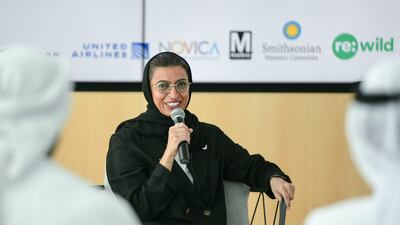The UN Security Council needs greater representation from around the world, particularly from the Arab region and Africa, said Noura Al Kaabi, Minister of Culture and Youth.
In an interview with The National, Ms Al Kaabi also highlighted the UAE's support for India to become a permanent member of the UN's top body.
"The world has changed, it has evolved, and it is crucial that the Council adapts towards that with better, more equitable representation, especially from the Arab region and Africa," Ms Al Kaabi said.
Russia's war in Ukraine has highlighted shortcomings in the Security Council's structure and critics say it is time for reform. The five permanent members who can veto meaningful action agree on little in today's fractured world, leaving the Security Council paralysed on key issues.
Moscow has wielded its veto prerogative multiple times to block the Security Council from intervening in Ukraine.
Ms Al Kaabi addressed the 15-member Security Council at the UN headquarters in New York last week, when she emphasised the UAE's belief in multilateralism and the need to address underrepresentation on the Council.
She noted how the UAE's position on multilateralism was reflected in how “our efforts reinforce UN processes across the system. Whether through our membership of the Security Council, hosting Cop28, or the 2031 Cultural Agenda with Unesco.”
It is also reflected, she added, in the UAE pursuing a foreign policy focused on dialogue and de-escalation. The UAE is currently serving a two-year term on the Security Council and has frequently called for de-escalation, particularly in the war in Ukraine.
On relations with India, whose population is expected to soon outstrip China's, Ms Al Kaabi noted how ties between Abu Dhabi and New Delhi had been strengthening in recent years. The UAE is now India’s third-largest trading partner.
“We see eye to eye on many issues, including at the Security Council,” Ms Al Kaabi said.
In February, the UAE and India signed a wide-ranging trade and economic pact that is expected to boost bilateral trade to over $100 billion within the next five years.
“The Comprehensive Strategic Partnership that the UAE and India signed in 2015 enabled the strong, multi-dimensional growth we’ve seen in our bilateral relationship," Ms Al Kaabi said.
She also touched on terrorism, one of the most pressing issues facing many nations.
“Terrorism has evolved as well, it has spread into different regions and conflicts and it is crucial that the Security Council meets the emerging threats," she said, noting that it was vital to address terrorists' use of advanced technology.
“We’ve experienced the consequences of that in the UAE in the January 17 attack, as have many other countries. So what we need is to build on the UN's existing counter-terrorism framework," she said.
Yemen's Iran-backed Houthi group attacked the UAE in what it said was an operation using missiles and drones, setting off explosions in fuel lorries that killed three people and caused a fire near the airport of Abu Dhabi.
Despite these challenges, Ms Kaabi said the UAE adopted an integrated, institutional approach that promotes tolerance, co-existence and diversity through regional and international partnerships and engagement with various stakeholders.
Ms Al Kaabi underscored the importance of a strong and unified international front and highlighted how "through culture we can counter terrorism".
In partnership with Unesco and the Iraqi Ministry of Culture, the UAE in 2018 launched the Revive the Spirit of Mosul initiative, a five-year project aiming to restore the urban, cultural and social elements of Mosul’s old town.
Plans included rebuilding the 850-year-old Al Nuri Mosque and a surrounding 11,050-square-metre complex of prayer halls and buildings, as well as Al Tahera and Al Saa'a churches.
In July 2014, ISIS leader Abu Bakr Al Baghdadi stood at the mosque's pulpit and declared Iraq and Syria as the terrorist group's "caliphate."
As Iraqi security forces drew closer to Mosul in June 2017, ISIS destroyed the structure and later used the explosion as propaganda, pinning the damage on a US-led coalition air strike.
“When you look into these sites,” said Ms Al Kaabi, “you realise that extremists wanted to destroy them because they are the physical representation of co-existence between people of different backgrounds and religions.
“Culture is at the core of our common humanity. So that’s where countering extremism must start.”


